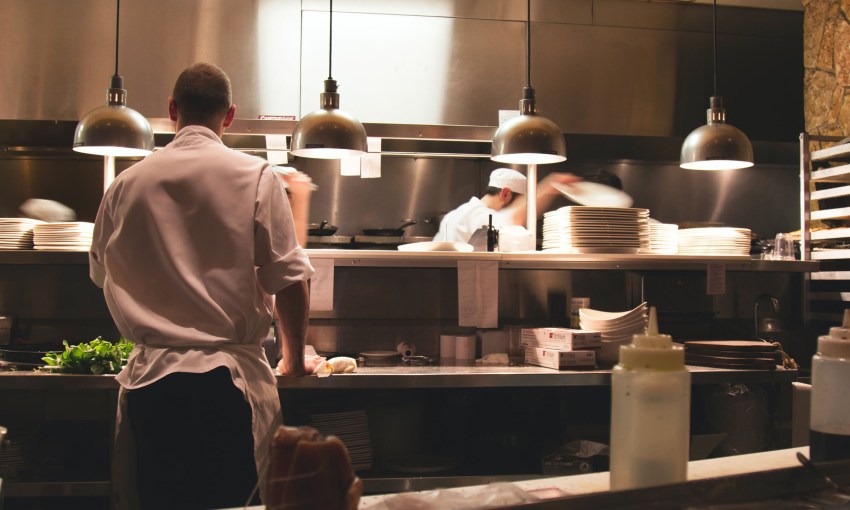As community feedback is sought for a draft wage theft bill, CityMag speaks with chef and anti-wage-theft advocate Henry Honner about how our hospitality scene could stamp out the practice.
How to fix hospitality’s wage theft problem
“The first job I ever had as a chef was in a high-end restaurant in the ‘90s and everyone wanted to work there,” national advocate against wage theft Henry Honner tells CityMag.
“But as a result, everyone who did work there worked for peanuts. We were working 20 or 30 hours a week overtime we weren’t paid for.
“After that, I worked for a couple of other restaurants where the experience was pretty similar: unpaid overtime, under award rates, and no penalty rates.
“We know wage theft is out there. There are a million stories, but there are not many people saying, ‘Well, this is the cause, and the people who we’re paying to fix this have actually been sitting on their hands and doing nothing.’”
Find information on what constitutes wage theft in our previous story on the subject.
If you’re an employer with experience in wage theft, we’d love to hear your side of the story.
Email askujins@solsticemedia.com.au if you’d like to speak with us.
Henry currently lives in Melbourne, but his career in Adelaide’s hospitality scene stretches from 1990 to 2000. He is not alone in his experience of wage theft.
The practice is defined as an employer deliberately not paying an employee their full entitlements, including superannuation, award and penalty rates, or leave.
Celebrity chef George Calombaris’ hospitality group MAdE was found guilty of underpaying staff $7.8 million in wages last year, joining a long list of high-profile businesses accused of the practice, throwing wage theft into the national spotlight.
Closer to home, the ABC reported last month one of South Australia’s largest independent retail groups, Romeo’s, has been accused of wage theft, with a class action suit claiming at least 500 employees were underpaid almost $20 million.
Labor MLC Irene Pnevmatikos chairs the South Australian Parliamentary Wage Theft Committee, which was established in 2018 to uncover the extent of the problem in the state.
After listening to stories from workers and families, and going over submissions from business advocacy organisations and unions – which included Henry Honner – the committee released its first interim report in July.
Irene and the committee’s four other members identified the prevalence of the problem – “I can say it’s significant,” Irene told CityMag in July.
One in five South Australian workers are likely to be affected by wage theft, particularly young workers, casual employees and women, the report found. Victims are overrepresented in the hospitality and retail sectors.

Picture: Bimo Luki
When asked about the prevalence of wage theft in the hospitality sector, general manager of the Australian Hotels Association’s South Australia branch Ian Horne tells CityMag, “a deliberate avoidance of wage obligations across the hospitality industry, I’d say, is very, very negligible”.
“Some awards are incredibly complex and easy for misinterpretation, but again, at the end of the day, that’s not an excuse,” he says.
His solution is for businesses to join unions, like his, and enquire when they’re unsure about workplace entitlements, such as complex award rates.
Irene is currently seeking community feedback on a drafted wage theft bill, which would criminalise and penalise employers found guilty of wage theft.
She tells CityMag she’s received support from Labor’s shadow cabinet and the broader community, particularly from business owners who understand wage theft undermines the whole sector. Drawing a competitive advantage in the marketplace by not paying your employees legally only makes it more difficult for businesses trying to do the right thing.

Henry Honner. Picture: Supplied
The bill includes financial penalties (maximum $300,000 fine) and/or incarceration (maximum fix years) if an employer is found guilty of committing wage theft.
Henry, on the other hand, has other ideas on how to fix the sector.
“It’s normal for a restaurant to pay a food and safety regulator to come into a building and make sure you’re compliant with your food safety plan,” he explains.
“Why can’t we piggyback on that system and deliver a wage compliance audit at the same time?”
Another possible solution, Henry suggests, is developing hospitality-sector education to include information on the fundamentals of running a business.
“If you’ve got two chefs in the back, a kitchen hand, and two front of house staff, how much do you need to make on a shift in order to pay those people? No one teaches that at Tafe,” he says.
The Fair Work Ombudsman offers FREE information on Australia’s workplace rights and rules.
Call 13 13 94 if you need help, or visit their website.
Australia was in the grips of a recession when Henry was working in kitchens during the ‘90s. (Following the 2000’s, Henry retrained as a carpenter, citing the inadequate pay and forced him to leave from frustration).
But last week Prime Minister Scott Morison confirmed Australia is in another recession – the first in three decades.
Both Irene and Henry are concerned about how a contracted economy and high unemployment will affect South Australia’s hospitality sector, which has already been hit hard by the pandemic.
“There’s a real business case for industry to fix this,” Henry says.
“Jobs will be scarce.
“The downside is if we fix it we will have a smaller industry that will be more profitable, but it will be able to better pay market salaries to attract people into the industry.”




